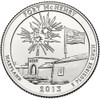
# CNMDFM25D - 2013 Ft. McHenry National Monument & Historical Shrine Quarter, D Mint
Fort McHenry National Monument Quarter
Denver Mint
Issue Date: August 26, 2013
Issue Quantity: 151,400,000
Fort McHenry National Monument Quarter Design Elements: Fort McHenry during "Defenders Day" celebration with fireworks overhead representing the "rocket's red glare"
Fort McHenry has been guarding Baltimore’s shoreline since the early days of the nation. It played a part in American history from the War of 1812 until World War I.
During the War of 1812, British forces defeated the Americans defending Washington, D.C. The English next set their sights on Baltimore. On September 13 and 14, 1814, Fort McHenry was bombarded by enemy ships anchored outside the harbor.
Aboard one of those ships was American lawyer Francis Scott Key, who was negotiating a prisoner exchange. From the deck of the HMS Tonnant, he watched the attack. The next morning, Key saw the American flag still flying over the fort. He was inspired by the scene to write a poem he entitled “The Defence of Fort McHenry.” Key set the poem to a popular tune and the resulting song is now known as “The Star-Spangled Banner.”
Fort McHenry remained in use during the Civil War, but by the beginning of the 20th century, the garrison was no longer necessary and the last company left in 1912. Five years later, new life was breathed into the old fort when it housed a 3,000-bed hospital during World War I.
In 1925, Fort McHenry became a national park and the hospital buildings were soon torn down. Today, nearly 600,000 people visit each year to experience one of our country’s national historic treasures.
Fort McHenry National Monument Quarter
Denver Mint
Issue Date: August 26, 2013
Issue Quantity: 151,400,000
Fort McHenry National Monument Quarter Design Elements: Fort McHenry during "Defenders Day" celebration with fireworks overhead representing the "rocket's red glare"
Fort McHenry has been guarding Baltimore’s shoreline since the early days of the nation. It played a part in American history from the War of 1812 until World War I.
During the War of 1812, British forces defeated the Americans defending Washington, D.C. The English next set their sights on Baltimore. On September 13 and 14, 1814, Fort McHenry was bombarded by enemy ships anchored outside the harbor.
Aboard one of those ships was American lawyer Francis Scott Key, who was negotiating a prisoner exchange. From the deck of the HMS Tonnant, he watched the attack. The next morning, Key saw the American flag still flying over the fort. He was inspired by the scene to write a poem he entitled “The Defence of Fort McHenry.” Key set the poem to a popular tune and the resulting song is now known as “The Star-Spangled Banner.”
Fort McHenry remained in use during the Civil War, but by the beginning of the 20th century, the garrison was no longer necessary and the last company left in 1912. Five years later, new life was breathed into the old fort when it housed a 3,000-bed hospital during World War I.
In 1925, Fort McHenry became a national park and the hospital buildings were soon torn down. Today, nearly 600,000 people visit each year to experience one of our country’s national historic treasures.











